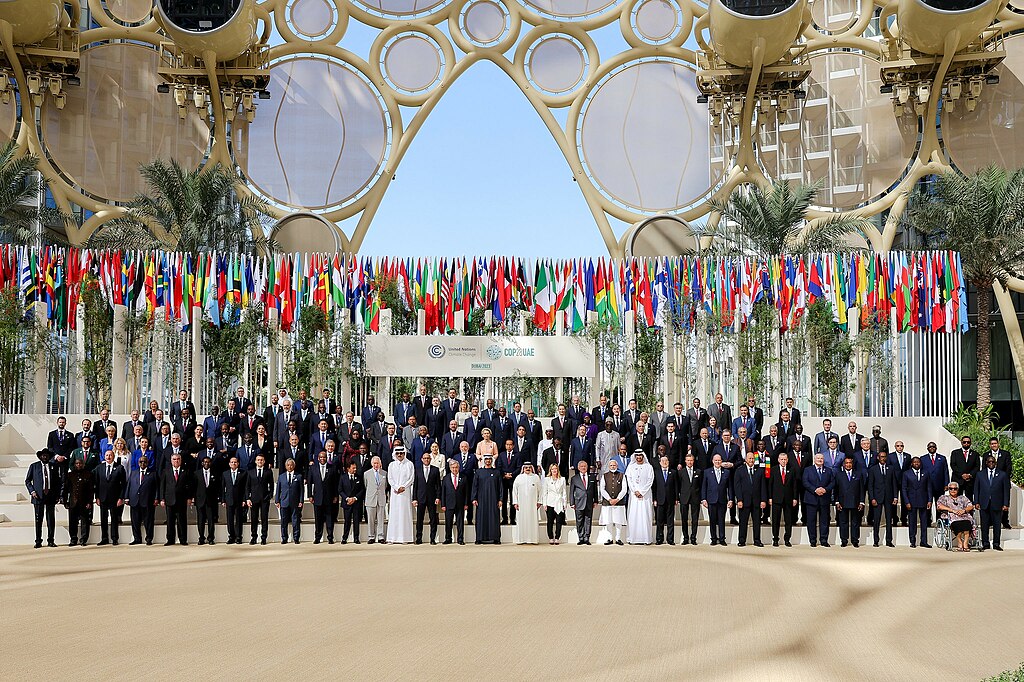
A little after 2am – hours after the end of the final official day (Tuesday 12th November) of COP28, delegates were told to go to bed and await a new draft text in the morning. The initial draft was roundly rejected on Monday as being too weak on action on fossil fuels. Sultan Al Jaber, the COP28 president, engaged in intense negotiations throughout Tuesday with heads of delegations both in groups and on a one-to-one basis to try and find a compromise which could be accepted as a final text. The main focus of these discussions remained on fossil fuels and whether the text would include a ‘phase-out’ or a ‘phase-down’ of fossil fuels. As talks reached a knife edge, negotiators had been asked by activists to ‘Hold the line’.
The plenary organised for 9.30am on Wednesday morning saw the gavel come down quickly on the new draft, with little time for comments. The new text received a standing ovation from the delegates assembled. I imagine many were relieved that any level of consensus had been reached and they could return to normal awake/asleep hours after a marathon two weeks in which the Irish delegation played an important role. Unfortunately, the speed at which the text was approved meant that not everyone, specifically representatives from the Small Island States, had actually arrived in the room and were therefore physically incapable of commenting on the quality of the draft text.
Worth a standing ovation?
The final text which was adopted during COP28 is, rather unbelievably, the first one to even mention the root causes of the climate crisis – fossil fuels. The majority of parties wanted wording around ‘phasing out of fossil fuels’. In the end the consensus reached was a downgraded text of ‘transitioning away from fossil fuels’. While on one level it can be considered an achievement to finally have fossil fuels even mentioned in a text, this is not the highly ambitious transformational change that is needed to avert the worst of the climate crisis.
The response to the text has been varied. While the final result has received a generally positive reaction, it is also nowhere near the level of commitment we need to drive down emissions and fossil fuel use. It can be viewed at the one time as both good and bad – Schrödinger’s COP – where the proof will be in the implementation and how fast we actually transition away from fossil fuels.
The text signals the start of the end for fossil fuels. It sets a direction away from fossil fuels towards renewables. To make this a reality, companies and countries who are currently investing in fossil fuel exploration and extraction need to reinvest in renewables. We can be under no illusion but that this will be a difficult task. There are loopholes in this text large enough for oil tankers to squeeze through and the language is already lending itself to countries justifying their exploration as ‘transitional’.
Climate Justice and food security
Some countries at this COP28 meeting were feeling the impacts of climate change more than others. The nations – especially Small Island Nation States and developing countries – which have contributed least to this crisis are enduring already devastating impacts.
Climate finance and Loss and Damage were high on the agenda ahead of this year’s COP. A central component of any meaningful climate justice is offering the vital support developing nations need to leapfrog the fossil-energy system, going straight to a society based on renewables. Unfortunately, while some money was promised, it is widely agreed that it is nowhere near enough. This topic is a continual source of disappointment. The failure of richer nations to put money on the table, in what is essentially reparations for the damage caused, fuels distrust.
This COP had also been dubbed as the ‘Food COP’. Negotiations around food systems and their impact on climate crisis and the issue of food security in a changing climate were on the schedule. Of course, as with the incredibly high number of fossil fuel lobbyists, meat and dairy lobbyists turned up in their droves in Dubai. There were high hopes early in the process after 134 countries (including Ireland) endorsed the Emirates Declaration on Sustainable Agriculture, Resilient Food Systems and Climate Action. However, the food security question seemed a little forgotten by the time the final text came around – overshadowed greatly by the fossil fuel question.
Where to from here
The COP process is fundamentally limited: The texts are not binding and its implementation relies on every country incorporating it in its national policies. So that is what now needs to be done. While this text is not perfect, it does not prevent ambition over and above what was agreed by consensus. As we enter a climate which is becoming ever more unpredictable and unfamiliar, the work now is to transform our societies into better, more sustainable versions of themselves. We must demand that more money is given as climate finance, recognising that supporting the most vulnerable countries in their adaptation to climate breakdown ultimately helps everyone. We must keep pressure on our Governments to make the difficult decisions to invest more in transforming our energy system towards renewables and our transport system into a more sustainable model which is not dependant on the private motor car.
We must also never underestimate the impact personal changes can have as ‘the mere fact that personal, family and community habits are changing is contributing to greater concern about the unfulfilled responsibilities of the political sectors and indignation at the lack of interest shown by the powerful…. we are helping to bring about large processes of transformation rising from deep within society.’ (LD §71)

